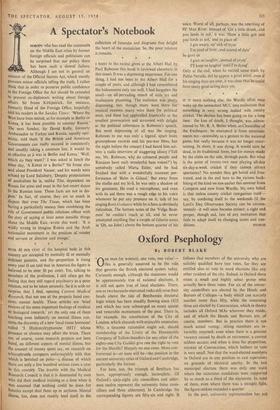A Spectator's Notebook
NOBODY who has read the comments on the Middle East crisis by former foreign officials and politicians can be surprised that our policy there has been such a dismal failure. Although I am not in general an admirer of the Official Secrets Act, which merely prevents minor officials telling the truth, I rather think that in order to preserve public confidence in the Foreign Office the Act should be extended to prevent ex-diplomats writing about foreign affairs. Sir Ivone Kirkpatrick, for instance, formerly Head of the Foreign Office, hopefully told his readers in the Sunday Times: 'Where the West have been united, as for example in Berlin or Korea, it has been possible to counter Russia.' The next Sunday, Sir David Kelly, formerly Ambassador to Turkey and Russia, equally opti- mistic, told them 'if the British and American Governments can really succeed in consistently and steadily taking a common line, it would be as effective as it was in Berlin and Korea."Well, Which do they want?' I was asked at lunch the other day, 'A Korea or a Berlin?' Sir Ivone also said about President Nasser, and his words were echoed by Lord Salisbury, 'Despite protestations of neutralism he is, unlike Tito, dependent on Russia for arms and must in the last resort dance to the Russian tune. These facts are not in dis- Pute.' In fact, of course, they are so much in dispute that even The Times, which has been having a particularly uneasy time combining the role of Government public relations officer with the duty of saying at least some sensible things about the Middle East,•wrote this week : 'It is wildly wrong to imagine Rugsia and the Arab nationalist movement in the position of master and servant or director and stooge.'
* *






























 Previous page
Previous page